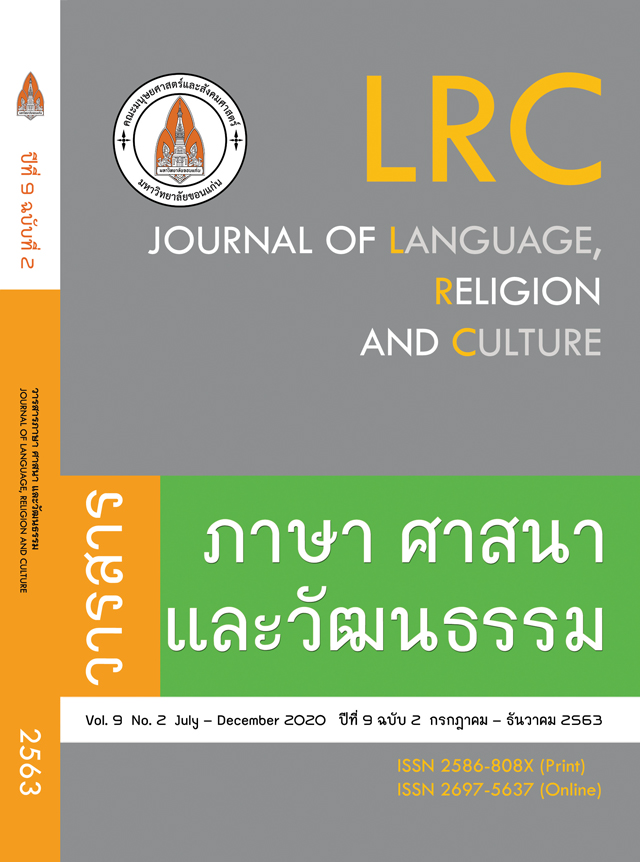สื่อการเรียนรู้ภาษาอังกฤษด้วยตนเองเพื่อวัตถุประสงค์เฉพาะสำหรับเจ้าหน้าที่ตำรวจศูนย์รับแจ้งเหตุฉุกเฉิน 191 : กรณีศึกษาในศูนย์รับแจ้งเหตุฉุกเฉิน 191 ตำรวจภูธรจังหวัดขอนแก่น
ESP Self-Learning Material for Thai 191 Policemen: A Case Study in 191 Khon Kaen Police Emergency Center
Keywords:
English for Specific Purposes (ESP), Needs Analysis (NA), 191 policemen’s English problems and needs, Self-learning materialsAbstract
Recently, in Thailand, there have been high demands for English usage in the workplace including law enforcement like police organizations. To successfully complete international communication, Thai policemen should be well-equipped with English language skills and knowledge. Self-learning material could be the main channel of their English learning. This qualitative study aimed to describe feasible components of English self-learning material that can serve English usage purposes of policemen working at 191 provincial emergency unit, Khon Kaen Province. Qualitative needs analysis covering the four aspects of their 1) police functions that English is used for, 2) current English language skills and knowledge, 3) weakness in English language skills and knowledge, and 4) requirement of English language skills and knowledge. The results of the needs analysis clearly reflected the components of effective English self-learning material that can serve learners’ needs of English, fill up the learners’ lacks, and enhance their English language skills and knowledge.
References
Belcher, D. (2009). What ESP Is and Can Be: An Introduction. English for Specific Purposes in Theory and Practice. Michigan ELT. Retrieved August 18, 2020 from http://www.press.umich.edu/titleDetailDesc.do?id=770237
Brown, J. D. (2009) ‘Foreign and second language needs analysis’. In M. Long and C. Doughty (eds.), The Handbook of Language Teaching (pp. 269 – 93). Oxford: Wiley – Blackwell.
Chambers, F. (1980). ‘A re-evaluation of needs analysis in ESP’. ESP Journal, 1(1), 25-33.
Chan, C. S. C. 2009. ‘Forging a link between research and pedagogy: a holistic framework for evaluating business English materials’. English for Specific Purposes, 28(2), 125–36.
Creswell, J. W. (2009). Research design: qualitative, quantitative, and mixed methods approaches. Sage Publications.
Dudley-Evans, T., & St John, M.J. (1998). Developments in English for specific purposes. Cambridge: Cambridge University Press.
Flowerdew, L. (2013). ‘Needs analysis and curriculum development in ESP’. In B. Paltridge & S. Starfield (eds.), The handbook of English for specific purposes (pp. 325-345). Malden, Mass.: Wiley-Blackwell.
Halliday, A.A.K., & McIntosh, A., & Strevens, P. (1964). The Linguistic Sciences and Language Teaching. (Longmans' Linguistic Library.) London: Longmans.
Hutchinson, T. & Waters, A (1987). English for specific purposes. Cambridge: Cambridge University Press.
Hyland, K. (2006). English for academic purposes: An advanced resource book. London, England: Routledge.
Hyland, K. (2006). ‘English for Specific Purposes: Some influences and impacts’. In Cummins, A. & Davison, C. (eds), The International Handbook of English Language Education. Vol 1, (pp. 379-390). Norwell, Mass: Springer.
Hyland, K. (2019). ‘English for Specific Purposes: Some Influences and Impacts’. In Gao X. (eds), Second Handbook of English Language Teaching (pp. 1-17). Springer International.
Hyland K. (2007). English for specific purposes: Some influences and impacts. In Gao X, (eds). Second Handbook of English Language Handbooks of Education. New York, USA: Springer, Cham (pp. 337-353).
Khamkaew, S. (2009). Needs and Problems in English Listening and Speaking Skills: A Case Study of the Metropolitan Police Officers at Counter Service at Chana Songkram Police Station. Unpublised MA Thesis. Master of Arts Degree in Business English for International Communication Program, Srinakharinwirot University, Thailand.
Long, M. H. (2005). Methodological issues in learner needs analysis. In M. L. Long (Ed.). Second Language Needs Analysis (pp. 19-76). Cambridge: Cambridge University Press.
McDonough, J. (2010). English for specific purposes: A survey review of current Materials. ELT Journal, 64(4), 467–477.
Munby, J. (1978). Communicative Syllabus Design. Cambridge: Cambridge University Press. National Economic and Social Development Board. (2016). The Twelve National Economic
and Social Development Plan. Retrieved September 5, 2020 from http://planning.dld.go.th/
Office of The National Broadcasting and Telecommunication Commission (NBTC). (2015). Information of Master Plan. Retrieved September 5, 2020 from https://www.nbtc.go.th/
Paltridge B, Starfield S. (2011). Research in English for specific purposes. In: Hinkel E (ed) Handbook of research in second language teaching and learning. Vol 2 (pp. 106-121). Routledge, London.
Patton, M.Q. (1999). Enhancing the quality and credibility of qualitative analysis. Health Sciences Research, 34, 1189–1208.
Plathong, K., Grisanaputi, W., Borwonpitak, N., & Noamchobthum, P. (2017). The Development of Effective 191 Emergency Telecommunication Network for the Establishment of National Emergency Center. Research Report. Bangkok: ThaiLIS Digital Collection.
Promwatcharanon, K., Chatreepinyo, P. (2016). ‘Problems and Needs of Traffic Police Officers for Enhancing Communicative English Abilities in Upper Northern Thailand’. Spectrum (Educational Research Service), 1-8.
Robinson, P. (1991). ESP today: A practitioner’s guide. Cambridge: Prentice Hall. UK: Prentice Hall International.
Romaya, P. (2009). The Professional Development of Tourist Police in Thailand: an Investigation into English Communication Competency. Unpublished Dissertation. Faculty of Arts. Edith Cowan University, Australia.
Sae-Jeng, S., & Sribayak, V. (2019). Problems and Needs of the Occupational English Language Skills for Thai Tourist Police Officers Working at One of the International Airports in Thailand. The 8th LITU International Graduate Conference Proceeding, 267-277.
Siwayingsuwan, P. (2015). Needs and Problems in English Listening and Speaking of Tourist Police Officers at Suvarnabhumi Airport. MA Thesis, Language Institute, Thammasat University, Thailand.
Songhori, M.H. (2008). Introduction to Needs Analysis. English for Specific Purposes, 4(4), 1-25.
Tantidumrong, P. (2016). The Quality of Public Service Assessment of the Project of 191, the Royal Thai Police, Case Study: The Emergency Call Center 191 of the Provincial. Integrated Social Science Journal. 3(1), 142-162.







